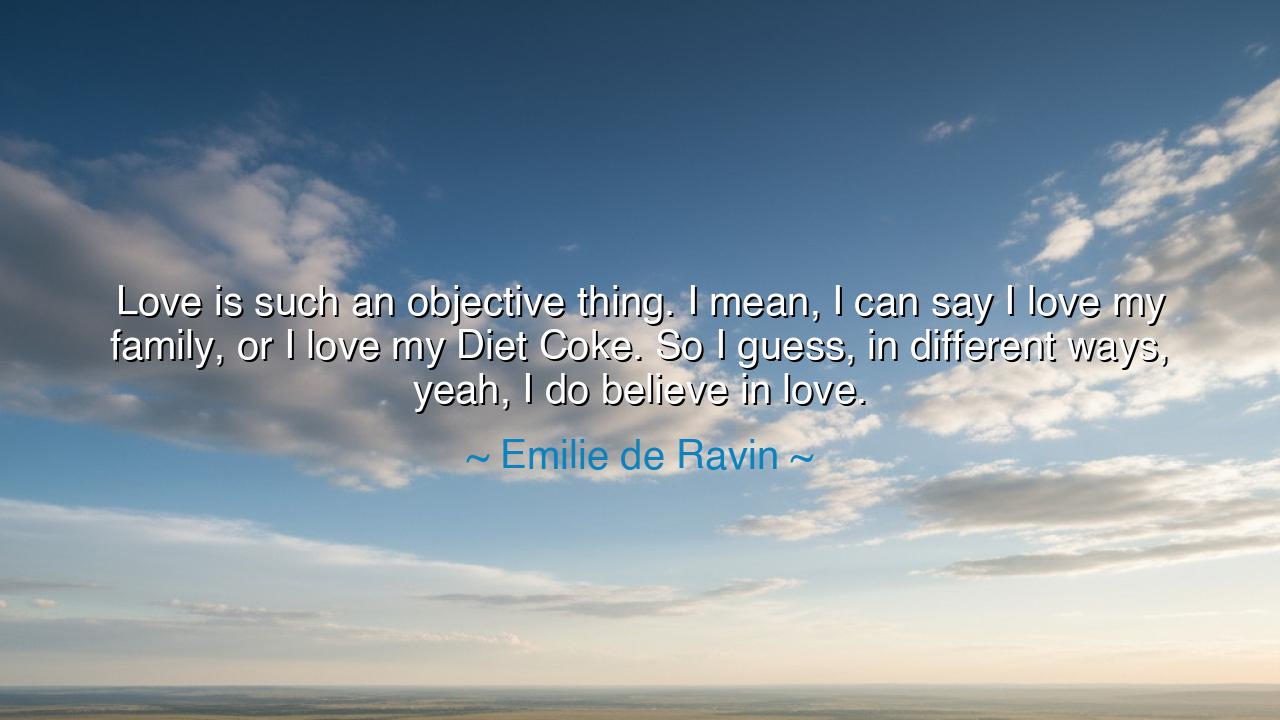
Love is such an objective thing. I mean, I can say I love my
Love is such an objective thing. I mean, I can say I love my family, or I love my Diet Coke. So I guess, in different ways, yeah, I do believe in love.






Listen, O children of wisdom, to the words of Emilie de Ravin, whose reflections on love reveal both its power and its complexity: "Love is such an objective thing. I mean, I can say I love my family, or I love my Diet Coke. So I guess, in different ways, yeah, I do believe in love." In these words lies a profound truth about the nature of love—a force that shapes the human spirit and connects us all, yet is as varied and dynamic as the hearts that feel it. Love, in its many forms, is both an idea and an experience, sometimes deep and transformative, and other times fleeting and surface-level.
In the ancient world, the philosophers grappled with the nature of love, seeking to understand how such a powerful force could shape the lives of men and women. The great Plato wrote of love in his Symposium, where he spoke of Eros—the passionate love that drives human beings toward connection and beauty. But Plato also spoke of agape, a more selfless, spiritual love, which transcended the physical and connected individuals to the divine. Love, in this sense, was not a singular thing, but a multifaceted force that could drive us toward truth, growth, and understanding. Emilie de Ravin echoes this complexity, acknowledging that love exists in many forms, each with its own unique power and significance.
Consider the great philosopher Socrates, who spent much of his life contemplating the nature of human connection and the pursuit of the good life. Socrates believed that love was an essential part of the human journey, but that it was not merely the physical affection we often associate with it. To him, love was the force that could lead us to wisdom, that could push us to seek truth and virtue. When Emilie de Ravin speaks of loving her family and her Diet Coke, she acknowledges the wide range of ways in which love manifests itself, and the complexity of the emotions that arise from these connections. Socrates might argue that love, in all its forms, is a gateway to higher understanding—whether it’s the love of kin, the love of self, or even the love of fleeting comforts.
But even in the simplest of forms, love has the power to transform. The ancient Romans understood this, for they recognized love’s ability to shape their communities. Cicero, one of Rome’s greatest orators, spoke of love as the foundation of human society. He believed that without love, we would have no sense of duty, no sense of belonging, and no true connection to one another. Cicero’s view reflects the power of love to create social bonds and cohesion, no matter the object of that love. Emilie de Ravin’s words also touch on this when she speaks of love in relation to both her family and her Diet Coke. While the two objects are vastly different, both provide her with a sense of comfort and connection in different ways—one deeply emotional, the other more casual, but both meaningful in their own right.
Yet, there is a lesson here, O children, for while love is indeed vast and varied, we must recognize the difference between the love that leads us toward growth and connection, and the love that might keep us tethered to things of lesser value. Emilie de Ravin’s acknowledgment that she can love both deeply meaningful things, like her family, and fleeting pleasures, like her Diet Coke, speaks to the nature of love as an ever-present force in our lives. But as the ancients understood, the true power of love lies not in its ability to comfort, but in its ability to elevate. Love must be a force that drives us toward higher purposes, toward truth and connection, not a force that keeps us rooted in the mundane or transient.
Just as Plato and Socrates taught that love should lead us toward wisdom and virtue, so too must we consider how the objects of our love influence our lives. If we love that which does not serve our growth or the well-being of others, we risk living a life tethered to the surface rather than to the depths of what it means to be human. The challenge, O children, is to understand that while we may love many things—some as deep as our family, and others as fleeting as our Diet Coke—we must strive to allow love to guide us toward purpose, toward meaning, and toward the connection that transcends the temporary.
Therefore, O children, let us embrace the fullness of love, but let us also understand its power and its purpose. Let us love deeply, but let us also love wisely. Let us allow love to nurture and transform us, guiding us to the things that will bring us closer to truth, wisdom, and growth. And as we walk this path, let us remember that love is not a singular thing but a force that takes many forms—each one powerful in its own right, each one shaping the person we become. Let love guide us, and let it lead us to become the highest version of ourselves.






AAdministratorAdministrator
Welcome, honored guests. Please leave a comment, we will respond soon